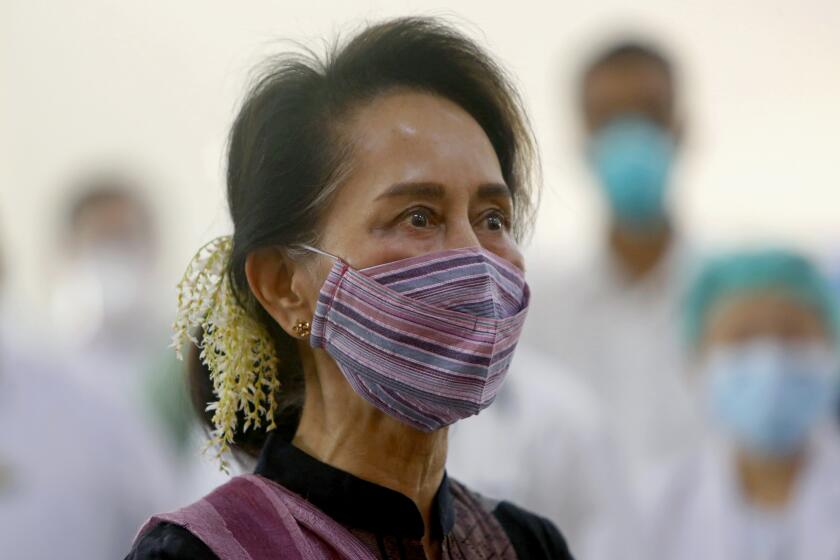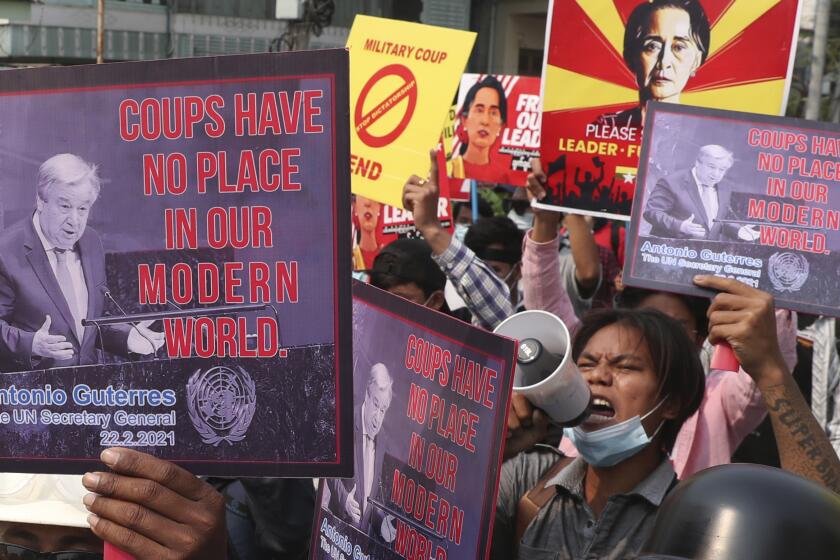Ousted Myanmar leader Aung San Suu Kyi’s son increasingly worried about her health

- Share via
BANGKOK — The younger son of ousted Myanmar leader Aung San Suu Kyi says he has always avoided talking to the media, but this time is different. He’s increasingly worried about his imprisoned 78-year-old mother’s health and about Myanmar’s violent political crisis, which he calls desperate.
“I’d just really like to have some form of contact with her so that I know that she’s OK, because at the moment she has no access to her legal counsel,” Kim Aris said Wednesday in a video interview with the Associated Press from his home in London.
For the record:
7:41 p.m. Sept. 15, 2023A previous version of this story misspelled the name of Aung San Suu Kyi.
“She has no access to her personal doctors. She’s not allowed any visitors, as far as I’m aware. She’s not even allowed to mingle with the other prisoners, which means she’s basically under a form of solitary confinement.”
Suu Kyi was arrested in 2021 when the army seized power from her democratically elected government and has since been tried and convicted on more than a dozen charges for offenses her supporters say were concocted to keep her out of politics. She is serving a total prison term of 27 years.
The military takeover triggered massive public resistance that was brutally suppressed, triggering a bloody civil war. Thousands have died.
Myanmar’s imprisoned former leader, Aung San Suu Kyi, is suffering from symptoms of low blood pressure including dizziness and loss of appetite.
Aris, 46, said he has tried to keep out of the spotlight for decades, seeking to avoid any political activism and “just trying to keep my head down and get on with my family life.”
“I’ve always tried to avoid speaking to the media and [have been] avoiding social media all my life. But the situation in Burma at the moment is absolutely desperate,” he said, referring to Myanmar by its other name. “The fact that I’ve not been allowed to communicate with my mother at all for over 2½ years now” is another reason he is speaking out, he said.
“So now I’m doing all I can to try and help the situation and bring awareness of this situation to the wider world,” he said. He is getting active on social media and said he plans a campaign to “bring awareness and funding for humanitarian purposes.”
Aris said he has heard that his mother has been extremely ill and has been suffering from gum problems and was unable to eat.
“She was suffering from bouts of dizziness and vomiting and couldn’t walk at one stage,” he said.
The prospects for peace in Myanmar, much less a return to democracy, seem dimmer than ever two years after the military seized power in a coup.
Aris said his information comes from independent Myanmar media and social media. Britain’s Foreign Office and the International Red Cross have tried and failed to learn more in his behalf, he said. He has tried reaching out to Myanmar’s military government, including its embassy in London, “but I don’t get any response from them. They wouldn’t even answer the door to me.”
It’s not the first time Suu Kyi has faced confinement. She spent nearly 15 years under house arrest under a previous military government starting in 1989, a year after co-founding her National League for Democracy party. But almost all of that time was at her family home in Yangon, the country’s biggest city, and she was not completely isolated.
“At that time, it was in her own home and she was allowed visitors. At times I was allowed to spend time with her under house arrest. And we were allowed to send her care packages and letters and have communication with her. For the last 2½ years, we have had none of those basic human rights.
“I realize that there’s so many natural disasters and humanitarian crises all over the world now, and it’s hard for everybody to be exposed to that every day,” Aris said. “We all need to try and do our bit to try and help everywhere that we can. And Burma is one country where we can change things very easily.”
He added: “If only 2% of what has been given to the Ukrainian forces had been given to the resistance forces in Burma, the situation would be very different now.”
More to Read
Sign up for Essential California
The most important California stories and recommendations in your inbox every morning.
You may occasionally receive promotional content from the Los Angeles Times.















